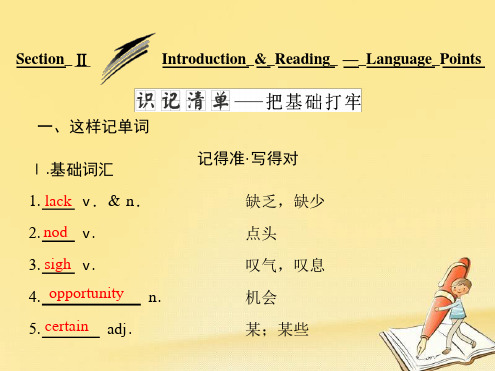18学年高中英语Module1SmallTalkSectionⅡIntroduction
- 格式:doc
- 大小:213.52 KB
- 文档页数:13
![[配套K12]2017-2018学年高中英语 Module 1 Small Talk Section](https://img.taocdn.com/s1/m/a74f479c284ac850ad0242c0.png)
Module 1 Small Talk Section Ⅰ Introduction &Reading-Pre-readingIn most Englishspeaking countries, it is normal and necessary to make “small talk” in certain situations.Small talk is a casual form of conversation that “breaks the ice” or fills an a wkward silence between people.Even though you may feel shy using your second language, it is sometimes considered rude to say nothing.Where do people make small talk?People make small talk just about anywhere, but there are certain places where it is very common.Most often, small talk occurs in places where people are waiting for something.For example, you might chat with another person who is waiting for the bus to arrive.People also make small talk in a doctor's or dentist's waiting room, or in queue at the grocery store. At the office, people make small talk in elevators or lunchrooms and even in restrooms, especially if there is a lineup.Some social events (such as a party) require small talk among guests who do not know each other very well.It is cal led “mingling” when people walk around in a social setting and talk to a variety of people.Why do people make small talk?There are a few different reasons why people use small talk.The first, and mostobvious, is to break an uncomfortable silence.Another reason, however, is simply to fill time.That is why it is so common to make small talk when you are waiting for something.Some people make small talk in order to be polite.You may not feel like chatting with anyone at a party, but it is rude to just sit in a corner by yourself.After someone introduces you to others, you do not know anything about them, so in order to show a polite interest in getting to know them better, you have to start with some small talk.Section_ⅠIntroduction_&_Reading_—_Prereading[原文呈现][读文清障]How Good Are Your Social Skills? Have you ever crossed the road to avoid talking ①to someone you recognise? Would you love to go to a party and talk confidently ②to every guest? Do you want to make more friends ③but lack ④the confidence totalk to people you don't know ⑤? And are you nervous about ⑥the idea ofbeing at a social event in another country? Don't worry — we can help you!Youneedn't ⑦worry about situations ⑧like these if you have good social skills. And they are easy to learn ⑨. People with good social skills communicate well and know how to have a conversation ⑩. It helps if you do a little advance planning ⑪.Here are a few ideas to help you.①avoid doing sth.避免做某事avoid 后接动名词作宾语,不可接动词不定式。


高中英语Module1SmallTalkSectionⅡLearningaboutLanguage教案含解析外研版选修6092932Section ⅡLearning about LanguageⅠ.单词拼写根据汉语或首字母提示,写出下列单词1.It is a popular show, so advance(预先的) booking is essential.2.She sighed(叹气) as she lay back on the bed.3.He closed the book,yawned(打呵欠), and went to bed.4.She nodded her head when she passed me in the street.5.Though lacking money, we still want to put the idea into practice.6.I'd like to take this opportunity to thank everyone for your hard work on the project.Ⅱ.拓展词汇根据词性和汉语提示,写出下列单词1.formal adj.正式的→informal adj.非正式的2.serious adj.严肃的→seriously adv.严肃地3.confident adj.自信的→confidence n.自信心→confidently adv.自信地4.advance adj.预先的,在前的→advanced adj.先进的;高级的[寻规律、巧记忆]否定前缀inadj.+ly→adv.informal非正式的independent独立的inconvenient不方便的seriously严肃地confidently自信地fortunately幸运地根据提示补全下列短语1.make friends 交朋友,建立友谊2.(be) nervous about 对……神经紧张/害怕/胆怯/焦虑不安3.think of 想起,回忆起4.look away from 把目光从……移开5.in addition 除此之外,另外6.find out 了解(到);找出(信息)Ⅳ.选词填空选用上述短语的适当形式填空1.Making friends is easy but it is difficult to have true friends.2.The song made me think of the happy hours we spent together when young.3.The engineer hurried back to the factory and found out how the accident happened.4.It's good for your health to look away from the screen from time to time.5.I am nervous about my first day.You never know what's in store for you when you start a new job.[寻规律、巧记忆]be+adj.+about短语v.+away+from短语be nervous about对……神经紧张be anxious/curious about对……担忧/好奇look away from 把目光从……移开break away from 脱离run away from逃走;避开背教材原句记句式结构仿写促落实1.And they are easy to learn.而且这些技巧学起来容易。



课时跟踪练(一) Introduction & Reading — Pre reading Ⅰ.阅读理解AIn most languages, a greeting is usually followed by “small talk”. Small talk means the little things we talk about at the start of a conversation. In Englishspeaking countries people often make small talk about the weather: “Nice day, isn’t it?”“Terrible weather, isn’t it?” But there issomething special about small talk. It must be somethingwhich both people have the same opinion about. Thepurpose of small talk is to let both people agree onsomething. This makes meeting people easier and morecomfortable. People usually agree about the weather, so it is a safe topic for small talk. But people often disagree about religion or politics so these are not suitable topics for small talk in English. The topics for small talk also depend on where the conversation is taking place. At football matches, people make small talk about the game they are watching: “Great game, isn’t it?” At bus stops, people may comment about the transport system: “The bus service is terrible, isn’t it?”Greetings and small talk are an important part of conversation in any language. The way people greet each other and the things they talk about, however, may be different from one language to another. This shows that there is much more to learn when we learn a language than just the vocabulary and the grammar of the language. We also have to learn the social behavior of the people who speak it.语篇解读:本文讲述了在西方文化中,经常用small talk来开始一段对话,而且对话的内容的选择也是有一定讲究的。
Module 1 Small Talk-SectionⅡ一、用didn't need to do或needn't have done改写句子1.Thank you for telling me the news,but I have already known it.改写______________________________________________________2.There was no need for Jim to buy the dictionary,but he bought it.改写_____________________________________________3.I was given a ticket for last night's film,so I didn't buy one.改写_______________________________________________________4.It wasn't necessary for her to pay so much,but she did so.改写_________________________________________________________5.It was unnecessary for the manager to do such things himself.His assistant had done them for him.改写______________________________________________________二、用所给动词的正确形式填空1.With the popularity of private cars,road conditions need ______ (improve).2.Experts have no doubt that the number of children needing______ (help) is increasing.3.When we got to the cinema,the film hasn't started yet,so we ______ (hurry).4.Your car needs ______ (mend).5.—You didn't wait for Elizabeth last night,did you?—Yes,but we ______.She didn't come at all.三、语法填空阅读下列材料,在空白处填入适当的内容(不多于3个单词)或括号内单词的适当形式。
Module 1 Small TalkSmall talk seems “small”, because it isgenerally thought to be informal and notserious. However, if you say the wrong thingon a certain occasion, you'll make both sidesawkward, for which you'll have to make anapology. As a consequence, it is necessary tobe aware of some basic social rules and do alittle advance planning.For example, if a friend who is not well off pays a visit to you, you can be hospitable to him, but never show off your riches during the conversation. Anyhow, you should be cautious about other people's feelings, even if he is an acquaintance.In addition, you should learn to be a good listener. While doing small talk, you shouldn't yawn, sigh, or look away from the person who is talking to you, trying to use positive body language.闲谈似乎是小事,因为人们一般认为闲谈不正式、不严肃。
Module 1 Small Talk Section Ⅱ Introduction &Reading-Language Points一、这样记单词三、这样记句式1.(教材P2)Do you want to make more friends but lack the confidence to talk to people you don't know?你是否想结交更多的朋友但又缺乏与陌生人交谈的信心?lack(1)v.缺乏,缺少我难以用语言来表达我的感谢。
②They are so rich that they lack for nothing.他们非常富裕,什么也不欠缺。
(2)n.缺乏,不足(常与of连用,有时前面可加不定冠词a)Lack of vitamin B is making him seriously ill.缺少维生素B使他病得很重。
④He was acquitted for/through_lack_of evidence.因证据不足他被宣告无罪。
⑤She seems to be totally lacking in common sense.她似乎一点常识都没有。
[名师点津] lack用作不及物动词时,通常与for和in连用。
2.(教材P2)It helps if you do a little advance planning.要是预先做些准备,将会对你有所帮助。
advance(1)adj.预先的,在前的①It is a popular show, so advance booking is essential.这是个很受欢迎的演出,所以一定要提前订票。
[名师点津] advanced也是形容词,意为“高级的,先进的”。
②We need to learn advanced (advance) technology from foreign countries. 我们需要向外国学习先进技术。
(2)v.前进;促进;提出;提前advance on/towards sb./sth. 向……前进③The strikers advanced on/towards us, shouting angrily.罢工的人愤怒地喊叫着向我们逼近。
(3)n.前进;进步;发展;提升在过去十年里,医学取得了巨大的进步。
⑤You'd better make a plan in_advance.你最好提前制订一个计划。
⑥He is far in_advance_of his class.他在班上遥遥领先。
[语境串记] With the help of the advanced technology, we can complete the task inadvance.在高科技的帮助下,我们可以提前完成这项任务。
3.(教材P2)think of things to tell people about your studies想出一些有关你学习的事情告诉别人think of想起,回忆起;考虑;想出你能想出一个交友的好办法吗?②I will think_over your suggestion, and let you know my decision in a day or two.我将仔细考虑你的建议,并在一两天后把我的决定告诉你。
③We all think of her as a responsible teacher.我们都认为她是一位很负责的教师。
4.(教材P3)look away from the person who's talking to you把目光从正跟你说话的人身上移开look away from把目光从……移开听见喧闹声,他们的目光从书本上移开了。
②I hope I could have time to look_through my lessons before the examination.我希望有时间在考试前浏览一遍我的功课。
③He looks_down_on/upon anyone who hasn't had a college education.他看不起没有受过大学教育的人。
④I like to look_back_on my highschool days, which were the happiest in my life.我喜欢回顾我的中学时代,那是我生命中最快乐的时光。
5.(教材P3)In addition, you need to know how long you should stay, and when you have to leave.另外,你需要知道你该待多久,还有该在何时离开。
in addition除此之外,另外①You need money and time.In addition, you need diligence.你需要钱和时间,除此之外,你还需要努力。
[辨析比较] in addition, in addition to②The outofclass activities help build up children's character in_addition.另外,这些课外的活动有助于培养孩子们的性格。
③In_addition_to my studies, I got involved in lots of social activities.除了学习以外,我还参加许多社交活动。
[名师点津] 表示“除了,此外”的单词、短语还有:①except 除了……之外(别无)②apart/aside from 除了……之外(还有);除了……之外(别无)③as well 也,而且6.(教材P3) Remember also that in some countries, you mustn't take flowers of a certain colour, because they're unlucky.还有,要记住在有的国家你绝不能带某种颜色的花,因为它们是不吉利的。
certain(1)adj.某,某些①A certain person called on you yesterday.昨天有个人来拜访过你。
②For certain_reasons I will be unable to attend the meeting.因为某种原因,我不能出席这次会议。
(2)adj.确定的,肯定的;确信的,无疑的③It is certain that they will come next week.他们肯定下周来。
④He is certain to succeed (succeed) in doing his experiment.他做试验一定会成功。
⑤I am afraid I can not be certain about/of that.恐怕对那件事我不能肯定。
[辨析比较] certain, sure⑥It's certain that they will agree.他们肯定会同意。
⑦You'll have to leav e soon to make certain/sure of getting there on time.你得快点出发,以确保准时到达那里。
1.And they are easy to learn.而且这些(技能)是容易学习的。
(1)本句含有“主语+be+adj.+不定式”结构,该结构中不定式用主动形式表示被动意义。
常用于此结构的形容词有:easy, difficult, hard, nice, good, dangerous, interesting, important, expensive, fit, comfortable, pleasant, impossible等。
①The book presented to you by the teacher is easy to understand.老师赠给你的这本书容易理解。
②The problem you referred to is difficult to_settle (settle).你提及的这个问题难以解决。
(2)若不定式中的动词为不及物动词,则应在其后加相应的介词。
③Mr Smith is easy to get along with.史密斯先生很容易相处。
④The flat, which is near the sea, is comfortable to live in.靠近大海的这套公寓住起来很舒适。
(3)句式“Sb./Sth.+be+adj.+to do”通常可以转化成“It+be +adj.+to dosth.”句式。
⑤The work is difficult to finish on time.=It is difficult to_finish (finish) the work on time.这项工作很难按时完成。
⑥David is easy to make friends with.=It is easy to make friends with David.和戴维交朋友很容易。
2.People with good social skills communicate well and know how to have a conversation.具备良好社交技能的人能很好地和别人交流并且知道怎样交谈。
句中how to have a conversation属于“疑问词/whether+不定式”结构。
此结构在句中可以作主语、宾语和表语。
作主语时谓语动词通常用单数。
常见的疑问词有who(m), how, when, where, which, what等。
①When to go for a picnic hasn't been decided.什么时间去野炊还没定下来。
②Surely the important thing is how to_raise (raise) enough money.重要的事情当然是如何筹到足够的钱。
③We don't know what_to_do next.我们不知道下一步该做什么。
④David will show you how_to_operate the advanced machine.戴维将给你展示如何操作这台先进的机器。
3.Talk to a man about himself, and he will speak to you for hours!和一个人谈论他自己,他就会和你说上几个小时!该句是一种常用固定句型,即“祈使句+and/or+陈述句”,意为“做某事,那么/否则就会……”。